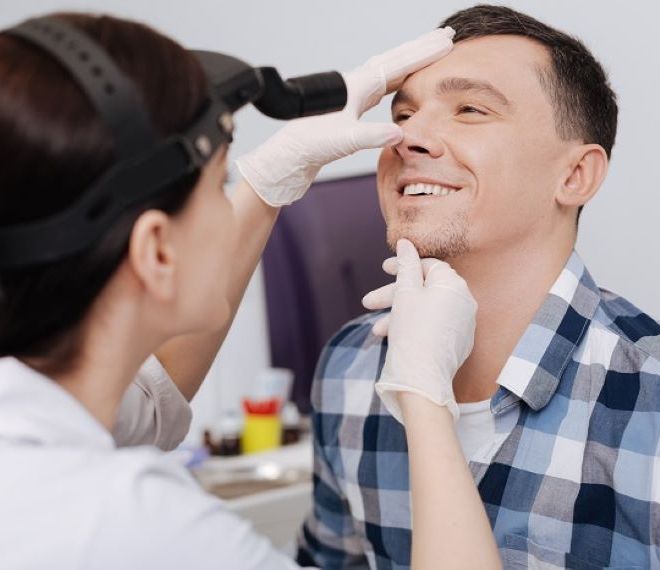Let's get rid of snoring!

Snoring is a sound phenomenon, which is created by the acceleration of air flow over the loose soft tissues due to the narrowing in the pharynx. Because of the accelerated air, the soft palate, the tongue or even the epiglottis resonate. Although good nasal breathing is important for good sleep, its absence does not necessarily cause snoring. Correcting nasal septum deviation is important in eliminating benign snoring, but this is only true in 10-20 percent of cases.
So snoring can be benign, just a sound phenomenon, which is more of an aesthetic problem, but it can also be pathological, behind which there can be a more serious sleep disorder. Obstructive sleep apnea disease is associated with loud snoring and breathing interruptions, snoring is irregular, has a particularly "ugly" sound, and is often followed by daytime sleepiness.
In fact, anyone can be affected by the problem, snoring in youth can often be of genetic or structural origin. However, the occurrence of snoring-sleep apnea is typically associated with a sedentary lifestyle and weight gain in the age group of 40. We can say that nearly 60% of men over 50 snore, sleep apnea is approx. It ranges between 1-5%. In women, the development of snoring is mainly due to hormonal effects, around climax. Being overweight is also a common cause of the disease, stress tends to cause trouble falling asleep and worsens the quality of sleep. According to Dr. Eszter Tóth, therapy cannot be complete without exercise and lifestyle changes. The goal is for the BMI (body mass index) to be close to the ideal 24-26, but definitely below 30.
Daytime activity is more affected by snoring associated with obstructive sleep apnea. The countless nocturnal breathing interruptions and the resulting awakenings disrupt the sleep process, resulting in sleep deprivation. The body wants to make up for this during the day, so such a patient may fall asleep during monotonous work or while driving. The memory function is damaged, our ability to concentrate decreases, not to mention that it can also lead to the development of serious diseases, e.g. hypertension, stroke, arrhythmia. In men, the disease can even cause erectile problems or a decrease in sexual libido. Long-term snoring-vibration destroys the receptors of the soft palate and pharyngeal mucosa in the long term, thus impairing the reflex that is supposed to keep our pharynx open at night. This and a number of other factors can eventually lead to the development of sleep apnea. It is therefore worth dealing with snoring in good time.
Our bodies are blessed with incredible tolerance, and a well-functioning automatic wake-up system helps us not to suffocate in our sleep. Of course, enormous stress processes take place in the body at this time, and it doesn't matter what other diseases we suffer from or how old we are. In very severe cases, the end may not be suffocation, but cardiac arrest.
What can we do to stop snoring? Sports, diet, maintaining sleep hygiene (going to bed early, at least 8 hours of sleep, avoiding electrical equipment before bed), stress management, and the use of anatomical pillows can help. It is important not to eat large amounts 2 hours before going to bed, and avoid alcohol.
In every case, the investigation of snoring starts with some type of instrumental sleep test, this can be a filter device that can be taken home or, in suspicious cases, an immediate sleep polysomnography. Of course, in all cases it is worth consulting with a specialist beforehand (somnologist, otolaryngologist or sleep specialist), who will order the appropriate examination. After that, regardless of the result, an otolaryngological examination is mandatory, since snoring or sleep apnea can be caused by direct or indirect otolaryngological changes and diseases.
For those whose snoring is clearly caused by being overweight or obese, it is advisable to start the therapy with diet and sports. Of course, there are also more direct solutions without surgery, e.g. the bite raising splint that can be placed on the dentures, which keeps the jaw fixed, does not allow our mouth to open at night. In the case of simple snoring, the most definitive solutions are still surgeries. If sleep apnea already exists, its primary treatment is the so-called positive pressure airway therapy, the surgical solution appears as part of secondary or additional treatment.
In case of simple snoring, the aim of the surgery is to tighten and scar the soft tissues. Several procedures are used for this worldwide, laser treatment was common 10-15 years ago, which involved very serious mucosal damage. Today, there is a much gentler solution, such as coblation surgery. The advantage of the method is that there is no explicit cut - unless the surgical technique requires it - and it involves only a small heat effect, so it does not significantly damage the surrounding tissue. The coblation procedure creates the reduction of the soft palate almost immediately, but the complete recovery in both cases takes 4-6 weeks. The operation is not painful if the goal is only to tighten the soft palate. Full recovery, about 6 weeks. The more difficult period immediately after surgery is approx. 10-12 days, in which case it's more like lumps, pain when swallowing, sometimes a slight increase in temperature, and even snoring becomes a little louder during this period due to local edema. After that, as the surgical area calms down and the expected scarring begins to form, these will all go away - and hopefully the snoring too.
You can make an appointment for an otolaryngology examination via our telephone customer service at +36 1 790 7070 or online!
Get to know our otolaryngologists:
Dr. Magdolna Bánki
Dr. Miklós Tóth
